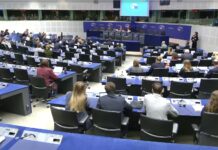The strategic agenda is a document published by the European Council (heads of governments of the member states) which provides directions for the next political cycle after every EU election. This is a de-facto government manifesto for the European Council. Five years ago, this document made the green transition a priority issue- that being the birth of the European Green Deal. Our Future Generations team was therefore eager to learn what would be the content of this year’s document, as it defines the main political priorities for 2024-2029, and thus gives important clues regarding the advocacy work for Future Generations.
Bold proposals
This year, the Strategic Agenda is full of bold proposals which are sometimes very clear, sometimes remain vague – which is probably the result of negotiations among governments. The clearest priority is defence for the EU and defence-industry spending to support Ukraine.
Besides the war, another significant debate was the assessment of the European Green Deal: Was it enough? Did it go too far or too fast? There were strong players on both sides of the argument, which led the Strategic Agenda to propose scaled-up climate action, increased social support connected to the transition, and more dialogue with the citizens while keeping all the existing commitments to climate neutrality and biodiversity protection.
This sounds compelling as if once all the questions were taken care of. But is it possible? In theory, the answer should be yes. But to be able to implement everything, the EU would need a significantly larger budget than it has at the moment, and a stronger centralization in certain areas. In practice, it is more likely that leaders would continue to debate about priorities, and while defence seems to emerge as a clear winner among portfolios, the rest of the priorities are still in question.
Will the Green Deal survive?
It is somewhat surprising that the Strategic Agenda does not mention the European Green Deal at all, despite it being one of the largest and most visible policies of the last cycle. Much ambition on climate and nature protection remained in the Agenda, but the Green Deal itself became a politically divisive idea. For it to survive, probably a new approach is necessary, that offers a stronger focus on citizen engagement and just transition – and probably a somewhat different language.
Does this agenda work for Future Generations?
We believe the Future Generations agenda would offer just that, but the Strategic Agenda does not mention it explicitly. A long-term vision is present in the document, but it seems to be more aspirational than offering real strategic goals, as the different objectives are sometimes in contradiction or require unlikely policies. While the vision stresses better engagement with citizens, it does not tell much about what is expected from them. Developing a culture of political participation is a long process that requires careful work from the institutions but also trust and commitment from the citizens. Similarly, the stated goals for example on agriculture are only possible if consumers accept that they need to change their diets significantly. The conclusion is therefore that the Council recognized many of the key challenges and published a document that identifies them along with some of the solutions. At the same time, the hard questions of financing all these ideas, necessary social behaviour change and the conflict between growth and sustainability make it hard to imagine how all these bold propositions would be implemented. We cannot eat our cake and keep it at the same time.
The document commits that, “the European Union will undertake the necessary internal reforms to ensure that our policies are fit for the future and financed in a sustainable manner and that the EU institutions continue to function and act effectively.”
Finally, the analysis of the Strategic Agenda reinforced our conviction that the propositions of the Future Generations Initiative are timely and necessary: legal and institutional solutions that promote well-grounded debates, long-term and science-based strategies and clearly defined priorities, would be a very useful tool for implementing the Strategic Agenda during the next political cycle.





